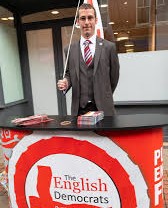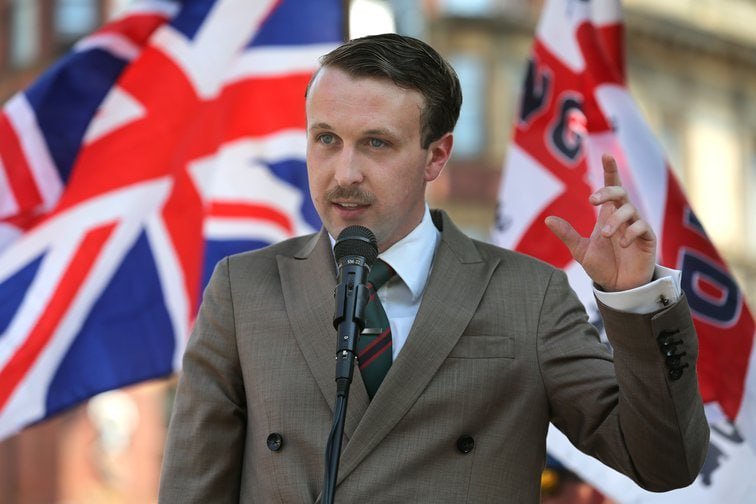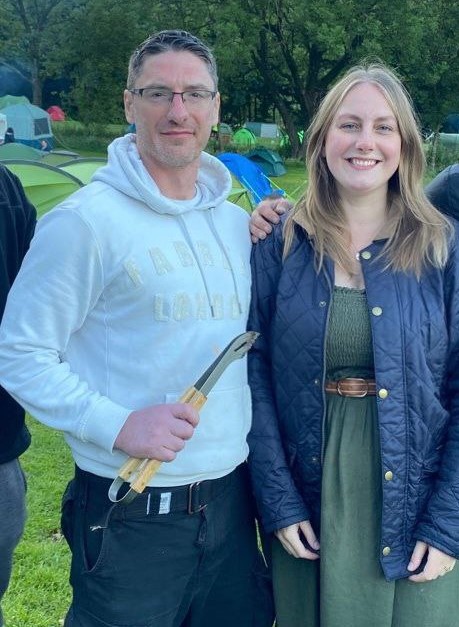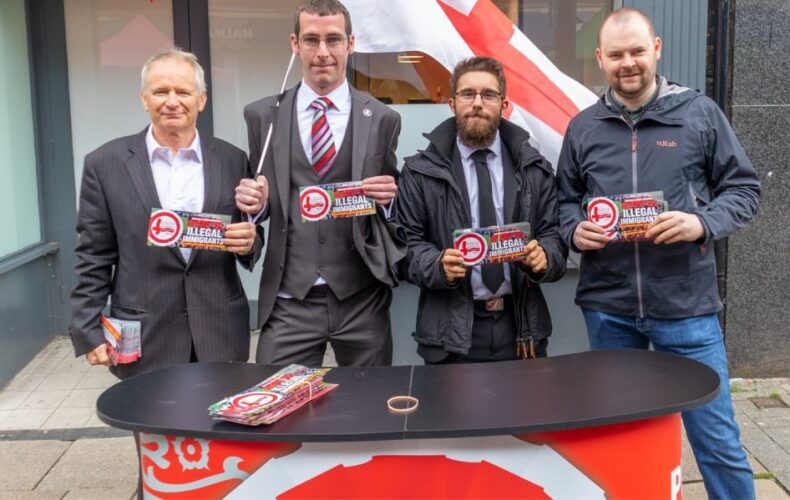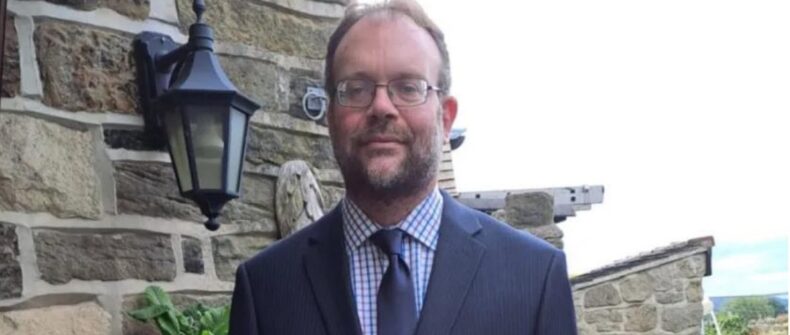
By Chuck Tanner and Devin Burghart, IREHR
On 15 June, influential white nationalist “Groyper” leader Nick Fuentes attempted to hold a fourth version of his America First Political Action Conference (AFPAC IV) in Detroit, Michigan. It was his latest move to pull the right in a more antisemitic and fascist direction.
Amidst the chaos of an ill-planned event, Fuentes (above) and a coterie of followers and “VIPs” were booted out of three venues. Along the way, Fuentes made clear his current strategy is not “America First,” but “antisemitism first” – a move befitting longtime neo-Nazi David Duke’s appearance in the Motor City to sing Fuentes’ praise.

David Duke turns out to hear Fuentes
When Fuentes and the Groypers emerged in 2019, they targeted the influential far-right college-oriented group Turning Point USA (TPUSA). In Detroit, Fuentes continued this practice with his near-annual ritual of showing up at TPUSA’s event to be quickly ejected.
Kicked out again
On 14 June, Fuentes was accompanied to TPUSA by a gaggle of Groypers and former MMA fighter Jake Shields. At Fuentes’s side, Shields confronted TPUSA security with the refrain that Nick’s expulsion was because “you can’t criticize Israel” there. Fuentes added, “Because Israel controls this event.” Getting laughter from his trailing Groyper sycophants, he declared, “This is America first, not Israel first.” The antics signaled the antisemitism rampant at the failed AFPAC IV.

White nationalist Nick Fuentes (red hoodie) at the first cancelled venue
Fuentes Fraud
Fuentes’ jaunt to TPUSA came on the same day AFPAC IV was booted from the Russell Industrial Center. On 15 June, Fuentes wrote, “The venue called the cops to kick us out 24 hours before the event.” Fuentes’ 330,000 Twitter followers and 62,000-plus Telegram subscribers were not informed until a day after the cancellation.
Jaden McNeil, an estranged former Fuentes ally, declared, “Instead of letting people know and working overtime to find a new one [venue], he did his routine TPUSA walkthrough and streamed on the couch with Sneako and Jake Shields.”
A spokesperson for the Russell Industrial Center explained that “The event was canceled due to fraudulent, knowing misrepresentation of the true nature of the event by the production company for their client.” They were told it was a “private, high-class corporate event” and that the center “downsize our normal security protocols as they kept ensuring this was a corporate event with all professional corporate attendees.”
McNeil contrasted this with previous AFPACs, “Nick’s team would call and report that there would be a Nazi event to see if they’d cancel” and “write contracts so if the venue pulled out they’d pay a ridiculous fee.” He added, “What you’re seeing is Nick for the first time attempt to do an event alone and fail MISERABLY.”
The number of Groypers scheduled to attend the event is in dispute. Fuentes claimed 2,000 guests were expected. A Proud Boys chapter argued Fuentes “wildly exaggerated how many were attending the conference. Claiming they’d sold out the space, but the organizers were trying to sell tickets at the door for the 700-person venue.”
Just under 300 Fuentes fans attended an outdoor speech by the Groyper leader, probably offering the best estimate of the potential size of an AFPAC IV crowd.
While far fewer than Fuentes’ “count,” it was larger than generally mustered by white nationalist groups like Patriot Front, National Justice Party, Blood Tribe, or Active Clubs.

Left to Right: Kevin DeAnna, Jared Taylor, Anthony Cumia, Nick Fuentes, Lucas Gage, Keith Woods
Behind closed doors
Booted from the Russell Center, the Groyper crowd went to a club in Greektown for a “close-door event” for “sponsors, AF [America First] students, and VIPs.” Those VIPs were drawn from longtime white nationalist movement figures Jared Taylor of American Renaissance and James Kirkpatrick (real name Kevin Deanna), as well as white nationalists Lucas Gage (Angelo John Gage) and Irish antisemite Keith Woods.

Jared Taylor at AFPAC’s hastily organised pub gathering
For years, Jared Taylor boosted the need to open the movement to white nationalist Jews – something that had led to conflict with neo-Nazi David Duke. At the beginning of his bar room speech, Taylor was greeted with cheers and chants of “Jared.” In turn, the veteran racist called the gathered Groypers “an inspiration.”Taylor, whom Nick Fuentes had recently dubbed “pro-Jewish” and a “Zionist,” did not visibly raise the issue of the event’s stark antisemitism.
In the wake of Fuentes’ loss of top lieutenants in recent years, Fuentes settled for a motley crew of lesser “VIPs” like Shields, anti-vaxxer Anastasia Loupis, and online “influencers” Anthony Cumia, Elijah Shaffer, Dan Lyman and “Leather Apron Club.” Other VIPs included activists who had moved to the right of their old far-right groups, like former TPUSA leaders Evan Kilgore and Morgan Ariel.
Fuentes’ VIPs also included a few people of color, such as streamer Tenyro, CensoredTV figure Ryan Katus Rivera, “journalist” Sulaiman Ahmed, and Patriot J.
People of color at such events have led some analysts to talk about a “multi-racial” brand of fascism. It would be a misnomer for this event. A handful of people of color had long traveled alongside the white nationalist movement.
“VIP” streamer Lyndon Perry pushed back against the idea that the event was multi-racial in any meaningful way. Bemoaning that the movement must face the reality of a multi-racial society and can’t expect “100 percent purity,” he pointed out that the crowd was some “95 percent” “white dudes,” save for a few “token minorities.” Perry also described that AFPAC speakers Jared Taylor, James Kirkpatrick, and Vincent James spoke “all about white identity.”
The inclusion of a few people of color caused consternation among other white nationalists, including Jason Kessler, a lead organizer of the murderous 2017 Unite the Right rally, and a Telegram account linked to the crassly racist American Futurist.
As the bar room event droned on, the speaker’s racism led things to escalate, resulting in the group being booted from the bar and Fuentes’ acolyte “Sneako” being punched by a security guard.
As Perry recounts, James Kirkpatrick stepped to the podium and gave the “most extreme” speech, including talking about needing a “white identity” and getting AIPAC “out,” referring to the American Israel Political Action Committee – something Perry interpreted as “like fuck Israel.” Perry continued that during Kirkpatrick’s speech, patrons at the bar celebrating a birthday “got angry” and turned up their music, leading to Perry getting a drink thrown at him.

The most telling ideological moment of the day came during Nick Fuentes’ 15 June speech in front of around 300 supporters across the street from the facility where the TPUSA event was held.
Antisemitism First
Fuentes’s 29-minute balcony bullhorn address amounted to little more than political posturing and antisemitic diatribe. Following audience chants of “Christ is King,” a common mantra among white nationalist Groypers, Fuentes primed his audience by declaring of TPUSA, “I don’t think they believe that Christ is king…At Turning Point, they think that Israel is king.”
While criticizing Israeli government policies in Gaza does not in itself constitute antisemitism, Fuentes’ version rehashes age-old antisemitic tropes of a “Jewish mafia” being in control of the United States.
Asserting that Detroit is a “city that was built by the great industrialist Henry Ford” (rather than the trade unionists who built the automotive industry), Fuentes praised Ford as a “great patriot” for “his activism in exposing the influence of the Zionist movement and the Jewish mafia,” specifically referencing the auto mogul’s publishing The International Jew. [This led to cheers and applause].”
Through his Dearborn Independent newspaper, Ford published antisemitic screeds, including The International Jew and a reprint of the notorious Protocols of the Elders of Zion, an antisemitic forgery used to gin up pogroms against Jews in Czarist Russia, later being embraced by German Nazi leaders. In 1938, Ford accepted the Grand Cross of the German Eagle from the German Nazis.
Nick Fuentes is also known for praising Adolph Hitler. Driving home such a presence in Detroit, Groypers Tyler Russell and Dalton Clodfelter posted a photo of themselves the day before the event – Clodfelter holding up a picture of Adolph Hitler and Russell appearing to raise a beer to the German Nazi Fuhrer.
Fuentes also drove home that his antisemitism and fascist proclivities are bound to Christian nationalism, castigating Israel for controlling “the Christian country that’s the United States of America,” blasting the idea of a “Judeo-Christian tradition” and repeating the antisemitic canard that Jews killed Jesus. Fuentes mocked the Judeo-Christian tradition, “If they’re talking about the Inquisition, well, you know, maybe I can get behind that.”
Asserting, antisemitic-style, that Israel controls the United States in a manner akin to 18th-century British colonialism, Fuentes proclaimed, “That is why the only patriotic movement that can claim the mantel of ‘America First’ is the one that says we must have a second American revolution from the Jewish mafia and the state of Israel.”
Loud cheers and chants of “America First” from the crowd ensued.
As if on cue to undergird Fuentes placing antisemitism at the heart of his white nationalist politics, veteran neo-Nazi David Duke showed up in Detroit where he described that he was present “to support Nick” and that he considers Fuentes a “comrade.”



